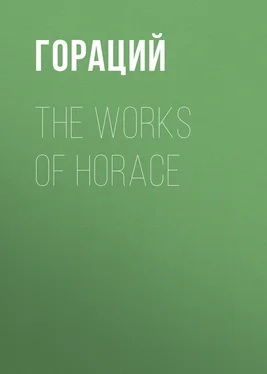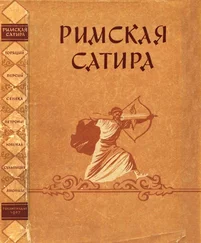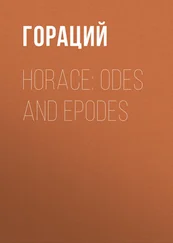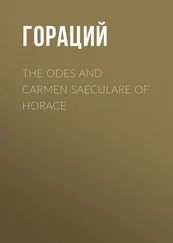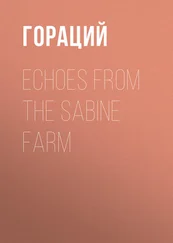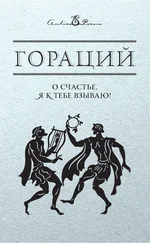Квинт Гораций Флакк - The Works of Horace
Здесь есть возможность читать онлайн «Квинт Гораций Флакк - The Works of Horace» — ознакомительный отрывок электронной книги совершенно бесплатно, а после прочтения отрывка купить полную версию. В некоторых случаях можно слушать аудио, скачать через торрент в формате fb2 и присутствует краткое содержание. Жанр: foreign_poetry, Поэзия, foreign_antique, foreign_prose, на английском языке. Описание произведения, (предисловие) а так же отзывы посетителей доступны на портале библиотеки ЛибКат.
- Название:The Works of Horace
- Автор:
- Жанр:
- Год:неизвестен
- ISBN:нет данных
- Рейтинг книги:3 / 5. Голосов: 1
-
Избранное:Добавить в избранное
- Отзывы:
-
Ваша оценка:
- 60
- 1
- 2
- 3
- 4
- 5
The Works of Horace: краткое содержание, описание и аннотация
Предлагаем к чтению аннотацию, описание, краткое содержание или предисловие (зависит от того, что написал сам автор книги «The Works of Horace»). Если вы не нашли необходимую информацию о книге — напишите в комментариях, мы постараемся отыскать её.
The Works of Horace — читать онлайн ознакомительный отрывок
Ниже представлен текст книги, разбитый по страницам. Система сохранения места последней прочитанной страницы, позволяет с удобством читать онлайн бесплатно книгу «The Works of Horace», без необходимости каждый раз заново искать на чём Вы остановились. Поставьте закладку, и сможете в любой момент перейти на страницу, на которой закончили чтение.
Интервал:
Закладка:
ODE VIII.
TO BARINE.
If any punishment, Barine, for your violated oath had ever been of prejudice to you: if you had become less agreeable by the blackness of a single tooth or nail, I might believe you. But you no sooner have bound your perfidious head with vows, but you shine out more charming by far, and come forth the public care of our youth. It is of advantage to you to deceive the buried ashes of your mother, and the silent constellations of the night, together with all heaven, and the gods free from chill death. Venus herself, I profess, laughs at this; the good-natured nymphs laugh, and cruel Cupid, who is perpetually sharpening his burning darts on a bloody whetstone. Add to this, that all our boys are growing up for you; a new herd of slaves is growing up; nor do the former ones quit the house of their impious mistress, notwithstanding they often have threatened it. The matrons are in dread of you on account of their young ones; the thrifty old men are in dread of you; and the girls but just married are in distress, lest your beauty should slacken [the affections of] their husbands.
ODE IX.
TO TITUS VALGIUS.
Showers do not perpetually pour down upon the rough fields, nor do varying hurricanes forever harass the Caspian Sea; nor, my friend Valgius, does the motionless ice remain fixed throughout all the months, in the regions of Armenia; nor do the Garganian oaks [always] labor under the northerly winds, nor are the ash-trees widowed of their leaves. But thou art continually pursuing Mystes, who is taken from thee, with mournful measures: nor do the effects of thy love for him cease at the rising of Vesper, or when he flies the rapid approach of the sun. But the aged man who lived three generations, did not lament the amiable Antilochus all the years of his life: nor did his parents or his Trojan sisters perpetually bewail the blooming Troilus. At length then desist from thy tender complaints; and rather let us sing the fresh trophies of Augustus Caesar, and the Frozen Niphates, and the river Medus, added to the vanquished nations, rolls more humble tides, and the Gelonians riding within a prescribed boundary in a narrow tract of land.
ODE X.
TO LICINIUS MURENA.
O Licinius, you will lead a more correct course of life, by neither always pursuing the main ocean, nor, while you cautiously are in dread of storms, by pressing too much upon the hazardous shore. Whosoever loves the golden mean, is secure from the sordidness of an antiquated cell, and is too prudent to have a palace that might expose him to envy, if the lofty pine is more frequently agitated with winds, and high towers fall down with a heavier ruin, and lightnings strike the summits of the mountains. A well-provided breast hopes in adversity, and fears in prosperity. 'Tis the same Jupiter, that brings the hideous winters back, and that takes them away. If it is ill with us now, it will not be so hereafter. Apollo sometimes rouses the silent lyric muse, neither does he always bend his bow. In narrow circumstances appear in high spirits, and undaunted. In the same manner you will prudently contract your sails, which are apt to be too much swollen in a prosperous gale.
ODE XI.
TO QUINTIUS HIRPINUS.
O Quintius Hirpinus, forbear to be inquisitive what the Cantabrian, and the Scythian, divided from us by the interposed Adriatic, is meditating; neither be fearfully solicitous for the necessaries of a life, which requires but a few things. Youth and beauty fly swift away, while sapless old age expels the wanton loves and gentle sleep. The same glory does not always remain to the vernal flowers, nor does the ruddy moon shine with one continued aspect; why, therefore, do you fatigue you mind, unequal to eternal projects? Why do we not rather (while it is in our power) thus carelessly reclining under a lofty plane-tree, or this pine, with our hoary locks made fragrant by roses, and anointed with Syrian perfume, indulge ourselves with generous wine? Bacchus dissipates preying cares. What slave is here, instantly to cool some cups of ardent Falernian in the passing stream? Who will tempt the vagrant wanton Lyde from her house? See that you bid her hasten with her ivory lyre, collecting her hair into a graceful knot, after the fashion of a Spartan maid.
ODE XII.
TO MAECENAS.
Do not insist that the long wars of fierce Numantia, or the formidable Annibal, or the Sicilian Sea impurpled with Carthaginian blood, should be adapted to the tender lays of the lyre: nor the cruel Lapithae, nor Hylaeus excessive in wine and the earth born youths, subdued by Herculean force, from whom the splendid habitation of old Saturn dreaded danger. And you yourself, Maecenas, with more propriety shall recount the battles of Caesar, and the necks of haughty kings led in triumph through the streets in historical prose. It was the muse's will that I should celebrate the sweet strains of my mistress Lycimnia, that I should celebrate her bright darting eyes, and her breast laudably faithful to mutual love: who can with a grace introduce her foot into the dance, or, sporting, contend in raillery, or join arms with the bright virgins on the celebrated Diana's festival. Would you, [Maecenas,] change one of Lycimnia's tresses for all the rich Achaemenes possessed, or the Mygdonian wealth of fertile Phrygia, or all the dwellings of the Arabians replete with treasures? Especially when she turns her neck to meet your burning kisses, or with a gentle cruelty denies, what she would more delight to have ravished than the petitioner—or sometimes eagerly anticipates to snatch them her self.
ODE XIII.
TO A TREE.
O tree, he planted thee on an unlucky day whoever did it first, and with an impious hand raised thee for the destruction of posterity, and the scandal of the village. I could believe that he had broken his own father's neck, and stained his most secret apartments with the midnight blood of his guest. He was wont to handle Colchian poisons, and whatever wickedness is anywhere conceived, who planted in my field thee, a sorry log; thee, ready to fall on the head of thy inoffensive master. What we ought to be aware of, no man is sufficiently cautious at all hours. The Carthaginian sailor thoroughly dreads the Bosphorus; nor, beyond that, does he fear a hidden fate from any other quarter. The soldier dreads the arrows and the fleet retreat of the Parthian; the Parthian, chains and an Italian prison; but the unexpected assault of death has carried off, and will carry off, the world in general. How near was I seeing the dominions of black Proserpine, and Aeacus sitting in judgment; the separate abodes also of the pious, and Sappho complaining in her Aeohan lyre of her own country damsels; and thee, O Alcaeus, sounding in fuller strains on thy golden harp the distresses of exile, and the distresses of war. The ghosts admire them both, while they utter strains worthy of a sacred silence; but the crowded multitude, pressing with their shoulders, imbibes, with a more greedy ear, battles and banished tyrants. What wonder? Since the many headed monster, astonished at those lays, hangs down his sable ears; and the snakes, entwined in the hair of the furies, are soothed. Moreover, Prometheus and the sire of Pelops are deluded into an insensibility of their torments, by the melodious sound: nor is Orion any longer solicitous to harass the lions, or the fearful lynxes.
ODE XIV.
TO POSTUMUS.
Alas! my Postumus, my Postumus, the fleeting years gilde on; nor will piety cause any delay to wrinkles, and advancing old age, and insuperable death. You could not, if you were to sacrifice every passing day three hundred bulls, render propitious pitiless Pluto, who confines the thrice-monstrous Geryon and Tityus with the dismal Stygian stream, namely, that stream which is to be passed over by all who are fed by the bounty of the earth, whether we be kings or poor ninds. In vain shall we be free from sanguinary Mars, and the broken billows of the hoarse Adriatic; in vain shall we be apprehensive for ourselves of the noxious South, in the time of autumn. The black Cocytus wandering with languid current, and the infamous race of Danaus, and Sisyphus, the son of the Aeolus, doomed to eternal toil, must be visited; your land and house and pleasing wife must be left, nor shall any of those trees, which you are nursing, follow you, their master for a brief space, except the hated cypresses; a worthier heir shall consume your Caecuban wines now guarded with a hundred keys, and shall wet the pavement with the haughty wine, more exquisite than what graces pontifical entertainment.
Читать дальшеИнтервал:
Закладка:
Похожие книги на «The Works of Horace»
Представляем Вашему вниманию похожие книги на «The Works of Horace» списком для выбора. Мы отобрали схожую по названию и смыслу литературу в надежде предоставить читателям больше вариантов отыскать новые, интересные, ещё непрочитанные произведения.
Обсуждение, отзывы о книге «The Works of Horace» и просто собственные мнения читателей. Оставьте ваши комментарии, напишите, что Вы думаете о произведении, его смысле или главных героях. Укажите что конкретно понравилось, а что нет, и почему Вы так считаете.
